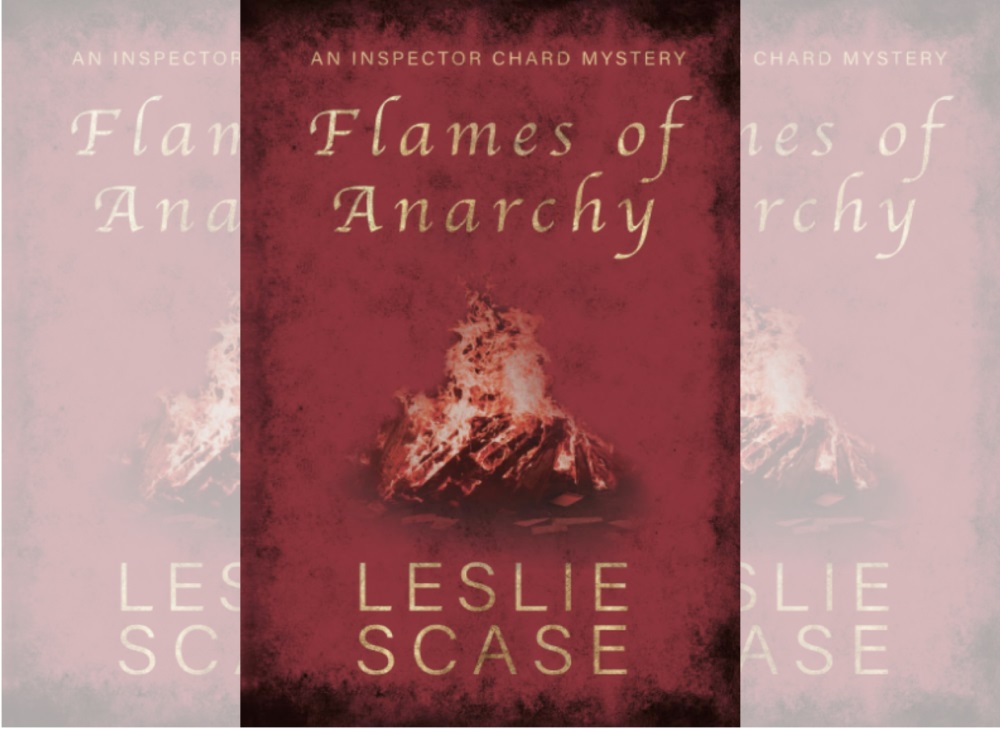Book review: Flames of Anarchy by Leslie Scase

Myfanwy Alexander
This thoroughly enjoyable book is the best yet in Scase’s ‘Inspector Chard’ series, a sequel to ‘Sabrina’s Teardrop,’ in which Chard was battling violent gangs in Shrewsbury.
Readers do not have to have read the previous episodes in Chard’s turbulent life to enjoy this story but I suspect that it does increase the ability to relish the fast pace and some of the politics: would a brief precis of the previous stories in the front of the book help?
Chard, returning to South Wales after his very eventful time in Shropshire find himself very much an outsider. He is tasked with investigating whether or not Glamorganshire Constabulary needs a dedicated detective branch and this is regarded by many as an unwanted intrusion.
Loner
Chard is also unpopular because he is blamed for the condition of Constable Morgan, who was injured whilst helping him. A real strength of this book was that the detective-as-outsider trope, which can be such a tired cliché, was given both relevance and immediacy in the narrative: he wasn’t a loner because that’s what detectives are like but because his history makes him such.
I was also relieved to see that there was some social consequence of Chard’s sexual conduct: I had been concerned that his exploits in ‘Sabrina’s Teardrop’ were feeling increasingly less Victorian but in ‘Flames of Anarchy,’ not only does Chard remain thankfully vertical throughout but also, he experiences the disapproval of others for his previous liaisons: this felt solidly like Nineteenth Century South Wales.
Anarchist
As if this reputational damage and a task resented by his peers was not enough, Chard has been asked to locate a dangerous anarchist, who just happens to be an old friend of his from university, in the hope of preventing an atrocity. We are soon introduced to an anarchist cell in Cardiff and though at times I did wonder if we were perilously close to the Monty Python’s People’s Front of Judea, Scase succeeds in creating distinct stories, motivations and voices for all members of the group.
From a reader’s perspective, they did arrive somewhat in a herd and perhaps the advent of each one might have had more impact had the process of presenting them been more staggered but they were a diverse and credible cross-section of idealists, misfits and unfortunates, united only by their resentments. I also greatly enjoyed the way in which attitudes to Cardiff were explored: yes, it was seen as the city of opportunity but also a hotbed of vice and home to any number of miscreants. Plus ça change, plus c’est la même chose.
Febrile
Perhaps it is because I read this novel in such a febrile atmosphere in contemporary politics but was pleased to find the moral tone of the discussions about social justice to be, if anything, underplayed. Scase lets the story make the point, particularly in the symbolic character of Dai Books. His history, losing his job with Lady Llanover and then running into trouble for failing to implement unjust policies in the school where he was teaching, might have been described as being rather on the nose but, instead, it was simply poignant.
Books is one of a group of pub-based characters who represent Chard’s attachment to ‘y werin bobol.’ I didn’t warm to them at first, because they felt somewhat stale but again, they earn their place in the narrative as well as generating humour.
There is a notable lack of female characters in this novel but, surfeited as I am with novels in which Victorian women and girls are presented as Sex in the City lady bosses, this felt fully justifiable. There is an advisory note at the top of the foreword warning readers that the book contains attitudes reflective of the values of Victorian Wales and Scace deserves full credit for his authenticity.
Scase deploys his knowledge of the police service at the time with remarkable skill, weaving the tension between innovation and accepted practice into the story smoothly. Taking South Wales in a time of change as the background for a ripping yarn may have been done before but seldom as well and with less preaching. There’s certainly a lot of incendiary drama in ‘Flames of Anarchy.’
Flames of Anarchy by Leslie Scase is published by Seren. It is available from all good bookshops.
Support our Nation today
For the price of a cup of coffee a month you can help us create an independent, not-for-profit, national news service for the people of Wales, by the people of Wales.





